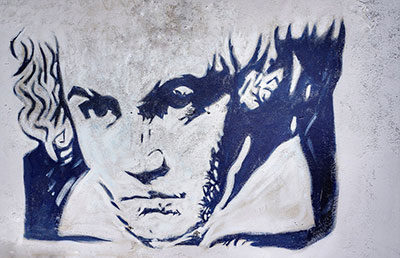We have embarked on the 4th part of our Beethoven Cycle. This is perhaps the most intense and exhausting programme of the whole cycle.
It opens with his first quartet from the early op.18. Even though it is not chronologically the first one of the set it is placed by Beethoven at its beginning for a good reason: it is perhaps the most striking of all the six early quartets. It is full of invention and humour, but the most astonishing by far is its slow movement – truly revolutionary by any standards. Apparently inspired by the tomb scene from Shakespeare’s Romeo and Juliet it explores contrast to the most extreme degree. It is full of exquisite lyricism which is interrupted by violent outbursts and sharp dramatic gestures punctuated by agonisingly long silences. There is a raw quality to this music almost unparalleled by anything else written by Beethoven for quartet in his later years.
The second quartet of our current programme is the famous “Razumovsky” No.3. It is one of the first quartets we ever learned as a student quartet at the Royal College of Music, so it has been with us for quite a long time – and yet it remains forever a great challenge. Its opening slow introduction to this day sounds “modern” with its jarring harmonies searching for any sense of home key. It is not until many bars into to main allegro movement that the quartet’s key is finally arrived at and it is an arrival well worth waiting for! The slow movement is full of melancholy – although no direct quotations are made its spirit is Russian – no doubt in honour of the quartet’s dedicatee. The minuetto is Mozartian in its grace, only the trio bearing more subversive trademarks of its composer. And then comes the wonderful fugue, which is one of the most satisfying and vivacious finales Beethoven ever wrote.
These two works alone feel like a full concert and yet after the interval we play the great op.132! Its slow movement is unique: steeped in the sound world of Palestrina, composed in the Lydian mode it feels like music from the edge of the other world – it is a religious mediation at the heart of a piece framed by two outer movements full of passion and often great yearning and anguish.
It is Hamburg, Gateshead and London’s Wigmore Hall this week (the Gateshead concert broadcast by BBC Radio 3) and then we are off to Snape for two live performance recordings.
